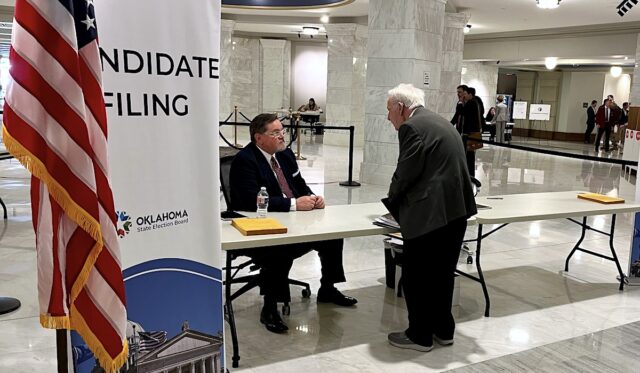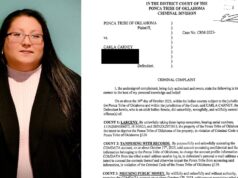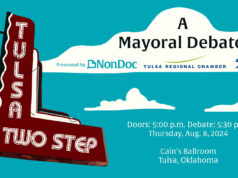
With longtime Commissioner Bob Anthony facing the end of his time in office because of term limits, the race for the open seat on Oklahoma’s Corporation Commission has drawn five candidates, including three Republicans, a Democrat and one Libertarian after the three-day filing period ended Friday.
The Corporation Commission race is the only statewide contest on Oklahoma’s 2024 ballots, aside from U.S. president.
Two Republican incumbents drew no challengers within their party in Oklahoma’s congressional districts. With few strong challenges facing incumbents, the most interesting race could become Oklahoma’s 5th Congressional District, where GOP Rep. Stephanie Bice drew no primary opponent but will face Democrat Madison Horn, who previously ran for U.S. Senate in 2022.
The deadline for candidates to contest the qualifications of an opponent is 5 p.m. Tuesday, April 9. Hearings for contestations of candidacies will be scheduled Thursday, April 18, and — if needed — Friday, April 19, before the Oklahoma State Election Board.
Five candidates vie for Corporation Commission
As Anthony’s time as corporation commissioner comes to a close, three Republicans filed to succeed him.
Brian Bingman, 70, Justin Hornback, 40, and Russell Ray, 55, will compete for the Republican nomination.
Bingman previously served as secretary of state from 2020 to 2023. Before that, he was a longtime legislator, serving in both chambers and ending his career as president pro tempore of the Oklahoma State Senate.
Bingman, who challenged Anthony unsuccessfully in 2018, is the heavy favorite to win the seat this year owing to an early fundraising, name identification and endorsement advantage. Hornback ran for corporation commissioner in 2022, losing in the Republican primary. Ray is a former journalist who currently serves as director of communications for Oklahoma CareerTech.
Harold Spradling, 89, is making another run for corporation commissioner, this time as a Democrat. Spradling ran as a Republican in 2022, finishing fourth in the primary behind Hornback.
Libertarian Chad Williams, 43, also filed to run for corporation commissioner. Williams has served as a chairman of the Libertarian Party of Oklahoma and as a member of the Choctaw City Council.
Hern draws one GOP challenger
U.S. Rep. Kevin Hern (R-OK1) drew one opponent for the GOP nomination for Oklahoma’s 1st Congressional District. Hern, 62, was first elected in 2018, succeeding Jim Bridenstine who left Congress to become director of NASA. He will be challenged by Paul Royse, 53, in the primary. He ran for U.S. Senate in 2022.
On the Democratic side, perennial candidate Evelyn Rogers, 71 and Dennis Baker, 69, are running for the Democratic nomination. Rogers has run for the First Congressional District twice before and also ran for U.S. Senate and Oklahoma House of Representatives in 2012 and 2014. Baker is a former Tulsa Police Department officer and FBI agent.
Mark David Garcia Sanders, 64, is running as an independent. He is an attorney who practices in the Tulsa area.
Brecheen wins GOP nomination for 2nd Congressional District
U.S. Rep. Josh Brecheen (R-OK2) will be the GOP nominee for Oklahoma’s 2nd Congressional District. Brecheen, 44, was elected in 2022 after predecessor Markwayne Mullin opted to run for U.S. Senate.
Brandon Wade, 47, was the lone candidate filing for the Democratic nomination for the 2nd Congressional District. Wade is president of the International Union of Operating Engineers Local 351.
Ronnie Hopkins, 67, is running as an independent.
Lucas draws two challengers for 3rd Congressional District
While no Democrats, Libertarians or independents filed to run for Oklahoma’s 3rd Congressional District, U.S. Rep. Frank Lucas (R-OK3) drew a pair of challengers for the GOP nomination.
Robyn Lynn Carder, 57, and Darren Hamilton, 62, are attempting to wrest the GOP nomination from Lucas. Carder has worked in the managed care industry for 30 years, according to her website. Hamilton has spent most of his career working with communications satellites, according to his website.
Lucas, 64, has served in the U.S. House of Representatives since 2003.
Cole reelection effort draws a crowd
U.S. Rep. Tom Cole (R-OK4) will be running for another term to represent Oklahoma’s 4th Congressional District alongside four other Republicans. Cole, 74, was first elected to Congress in 2003. Cole will be joined by Paul Bondar, 44, Nick Hankins, 38, Andrew Hayes, 40, and Rick Whitebear-Harris, 73, in the race for the GOP nomination. Hankins ran for governor in 2018.
Mary Brannon, 72, and Kody Macaulay, 35, are running for the Democratic nomination. Brannon is a retired teacher. Macaulay works in IT on Tinker Air Force Base and is a U.S. Air Force veteran.
James Stacy, 60, is running as an independent.
Bice vs. (Madison) Horn showdown looms in 5th District
U.S. Rep. Stephanie Bice (R-OK5) will be the GOP nominee for Oklahoma’s 5th Congressional District having drawn no Republican challengers. She will face Democrat Madison Horn, 34, whose professional career has been in cybersecurity.
Horn previously ran for U.S. Senate in 2022, losing to Sen. James Lankford (R-OK). Horn has spent her career in cybersecurity.
Bice, 50, was elected to the U.S. House of Representatives in 2020, defeating Democrat Kendra Horn, who is not related to Madison Horn. Bice previously served in the Oklahoma State Senate from 2014 to 2020.
A third candidate wanted to join the 5th Congressional District race Friday, — if he can get enough signatures.
Around noon Friday, D. Frank Robinson spent more than an hour visiting with State Election Board officials about his desire to run for the seat but his opposition to the $1,000 filing fee to be on the ballot. Candidates can collect and submit signatures totaling 2 percent of the registered voters in a specific seat to be placed on the ballot without paying the fee.
Robinson, a founding member of the Libertarian Party in the 1970s, ran for Oklahoma’s 5th Congressional District in 1980 and 1984. He said he wanted to sue to gain access to the ballot if the Libertarian Party would join him in the litigation because he considers the filing fee unconstitutional and the signature gathering requirement an inducement of unpaid labor.





















